
Magnesium supplements seemingly do it all. They can improve sleep, ease aching muscles, and even soothe issues like restless leg syndrome or lessen menopause symptoms. It’s truly a powerhouse of a supplement, playing a role in more than 300 functions in the body. Yet, despite this, many people (especially women and children) don’t get enough of it.
You might assume all magnesium supplements offer the same benefits, but that’s not the case. Magnesium comes in various forms, and some are absorbed more effectively than others, especially if your diet is low in this essential mineral.
A study suggested that “most cases of magnesium deficiency are undiagnosed. Furthermore, because of chronic diseases, medications, decreases in food crop magnesium contents, and the availability of refined and processed foods, the vast majority of people in modern societies are at risk for magnesium deficiency.”
In developed countries, the average intake of magnesium is slightly over 4mg a day, but the study suggests that “most people need an additional 300mg of magnesium per day in order to lower their risk of developing numerous chronic diseases. So while the recommended daily allowance (RDA) for magnesium (between 300mg and 420mg per day for most people) may prevent frank magnesium deficiency, it is unlikely to provide optimal health and longevity, which should be the ultimate goal.”
So, if you’re taking a supplement, which type works best, and how much should you take? These are all important things to know, so I spoke with nutrition experts to get the facts on magnesium supplements, the recommended dosages, and the top options for daily use.
Nutritionist Maz Packham explains that “magnesium is involved in everything from sleep, mood, to bone health and blood pressure, even energy production. It’s often referred to as nature’s tranquilliser because it’s a natural muscle relaxer. Magnesium glycinate is attached to the amino acid glycine, which is a calming neurotransmitter, making this a dream duo for sleep and relaxation”.
Because of its relaxing qualities, many people will take their magnesium supplements or apply magnesium body cream before bed. It can help to improve sleep quality as well as muscle recovery after a heavy gym session. But, it’s important to know your glycinate from your magnesium citrate and oxide, and the benefits each provide.
Foods, supplements, and wellness products like bath salts, creams, and sprays all contain different forms of magnesium. While whole foods remain the best and most bioavailable source of this essential nutrient, not everyone gets enough magnesium from their diet alone.
Nutritionist Jess Shand explains that “though magnesium is found in a variety of foods including leafy greens, whole grains and nuts and seeds, the process of refining foods combined with increasingly poor soil quality means we are not getting as much of this important mineral through our diets as we used to.”
Because of this, many people turn to magnesium supplements, though not all are high quality or provide the right types and amounts of magnesium. I asked Packham and Shand for their top recommendations and then tested each one. Keep reading for my editor-tested, expert-approved guide to the best magnesium supplements and where to buy them.
The best expert-recommended magnesium supplements for 2026 are:
- Best magnesium glycinate – Pure Encapsulations magnesium glycinate: £28.55, Pure-encapsulations.co.uk
- Best food-grown supplement – Wild Nutrition food-grown magnesium: £18.52, Amazon.co.uk
- Best marine magnesium – The Naked Pharmacy marine magnesium: £19, Thenakedpharmacy.com
- Best magnesium blend – Sixways unwind and recover mushroom blend: £32, Sixways.co
- Best vegan formula – Nutri Advanced megamag calmeze magnesium powder: £38.99, Nutriadvanced.co.uk
Read more: 10 best probiotics to help improve gut health, according to experts
Pure Encapsulations magnesium glycinate
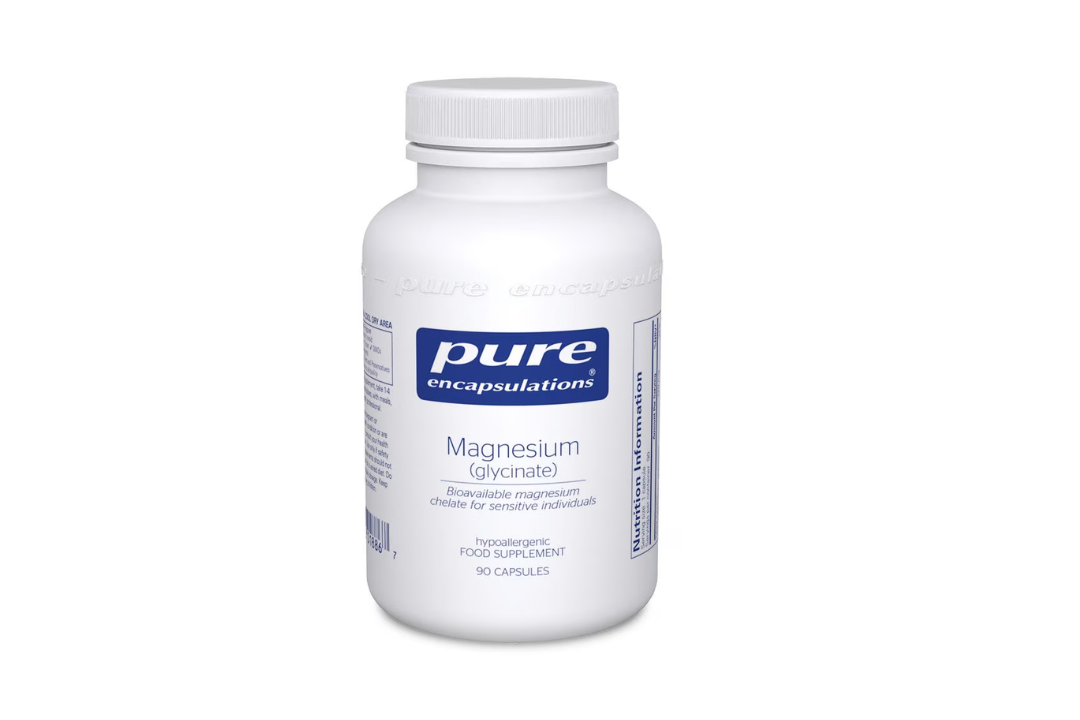
Best: magnesium glycinate supplement
Nutritional value (NV): 32 per cent
Magnesium type: Magnesium glycinate
How to take it: Take two capsules daily with water
Why we love it
- Absorbed well by the body
- Available in one, two, or three month supply
“I often recommend Pure Encapsulations magnesium glycinate, it’s a highly bioavailable form of magnesium, which means the body is easily able to absorb it, it’s also typically very well tolerated,” Packham explains.
You can buy this supplement in packs of 90, 180 and 360, with the recommended dosage being two capsules once or twice daily. If you’re trying it for the first time, the one-month supply might be your best option; however, if you’re stocking up, opting for a three-month supply is a better investment.
“If you’re prone to anxiety, stress, or poor sleep, this is the one for you as the magnesium is combined with amino acid glycine to help calm and aid relaxation. Stress (and alcohol) also deplete magnesium, increasing our need for it, so a supplement can help,” Packham adds.
Nutritionists often recommend this brand because it can be relied on for quality. In fact, it’s my go-to brand. I have plenty of Pure Encapsulations supplements in my store cupboard. It might not look as beautiful as other supplement brands, with its fairly plain pharmacy aesthetic, but this isn’t important because you know you’re getting an expert-recommended and highly absorbable product that’s expert-approved.
Buy now £28.55, Pure-encapsulations.co.uk
Wild Nutrition food-grown magnesium
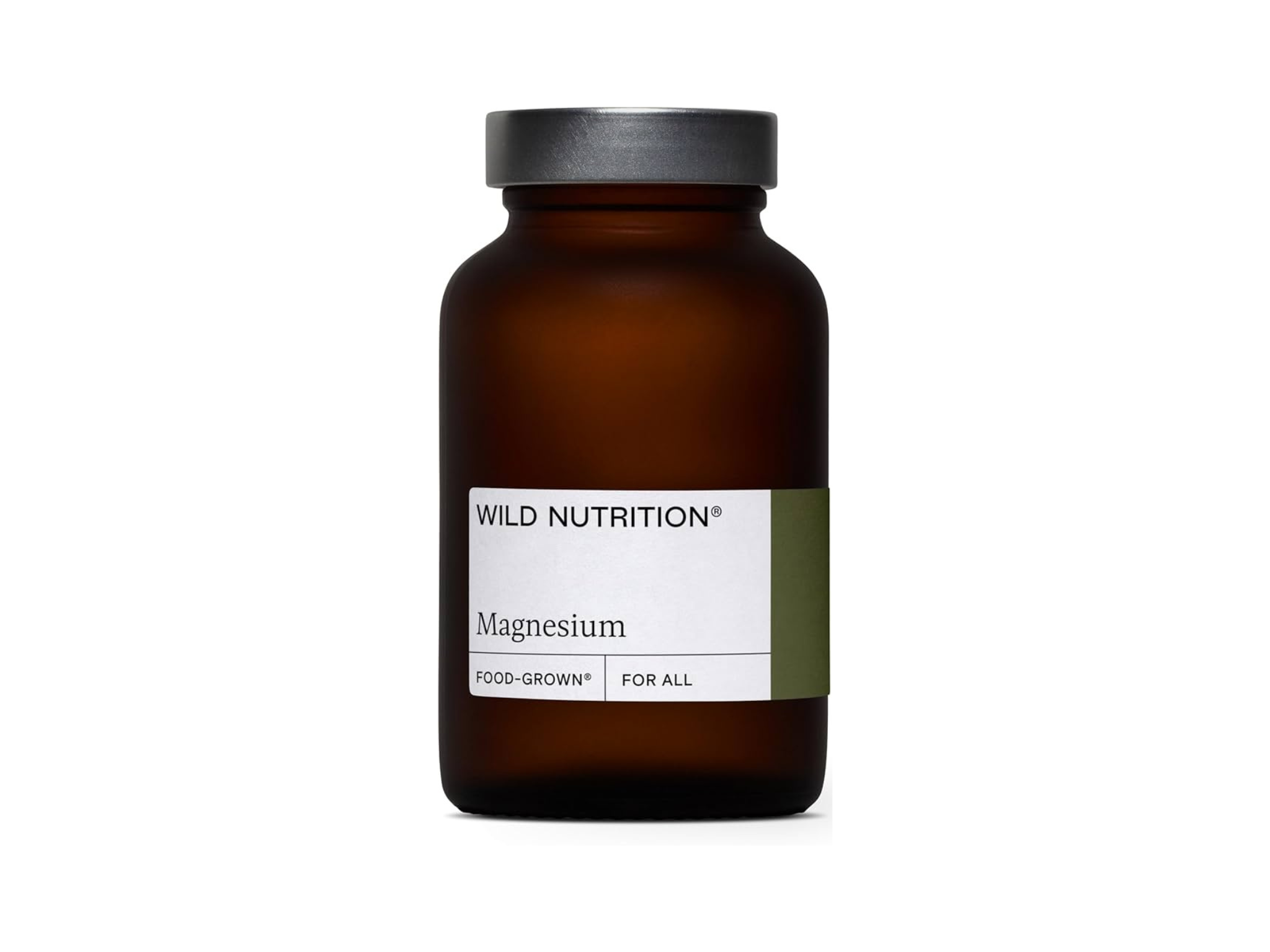
Best: food-grown magnesium supplement
Nutritional value (NV): 21 per cent
Magnesium type: Magnesium citrate
How to take it: Take two capsules daily with water
Why we love it
- Food grown nutrients
- Sustainable packaging
“This is my number one magnesium supplement on the market because it’s food-grown, which means it’s more bioavailable and therefore the body recognises it more easily and can absorb the capsules and utilise them in your body,” says Shand.
This 30-day supply of magnesium is sourced from natural ingredients and is combined with a probiotic called Lactobacillus bulgaricus for improved digestion and absorption. There are 60 capsules in a bottle, and Shand recommends taking two capsules at the end of the day before bed.
This is one of my favourite supplement brands because it offers quality food-grown products that have always worked very well for me. The packaging is also more sustainable with glass bottles and cardboard boxes instead of plastic. I take omega-3 and multivitamins from Wild Nutrition, as well as magnesium.
Buy now £19.5, Amazon.co.uk
The Naked Pharmacy marine magnesium
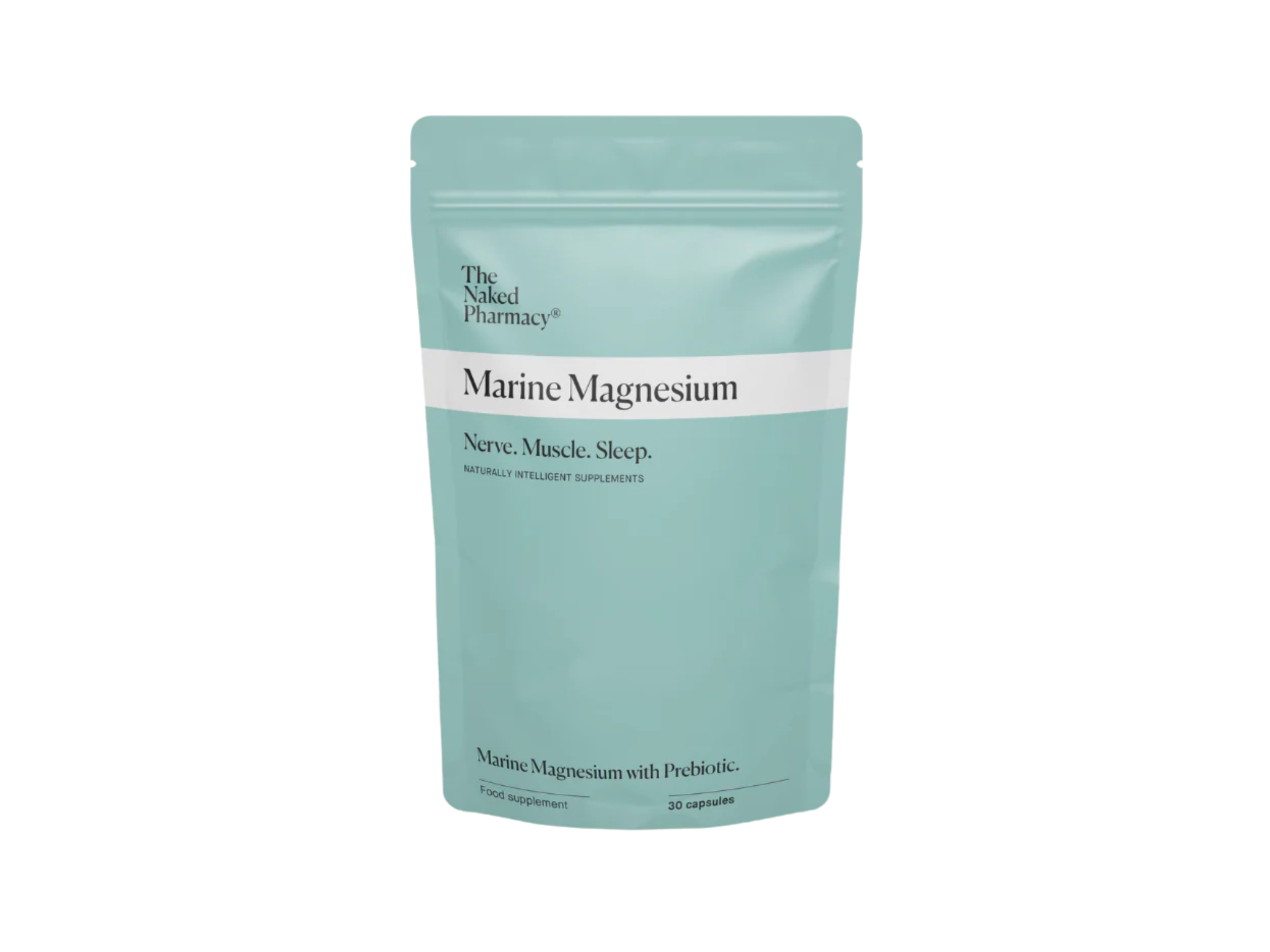
Best: marine magnesium supplement
Nutritional value (NV): Not specified
Magnesium type: Magnesium hydroxide
How to take it: Take one or two capsules daily with food
Why we love it
- Derived from totally natural sources
- Sustainable packaging
Packham notes that when it comes to this recommendation, “one capsule contains 100 per cent of your daily requirement of magnesium, plus it has added prebiotic to support the gut”.
The magnesium in this product is made from algae found in pure sea water, and the only other ingredients are organic baobab and a tapioca shell. This means it’s derived totally from natural sources.
“The brand also uses biodegradable packaging, which is another tick for me, and the pouches are easy to travel with,” adds Packham.
This is another of my trusted brands. The marine magnesium is in my daily stack, and I love the fact that there are no fillers or additives, which can upset the gut lining.
Buy now £19, Thenakedpharmacy.com
Sixways unwind and recover
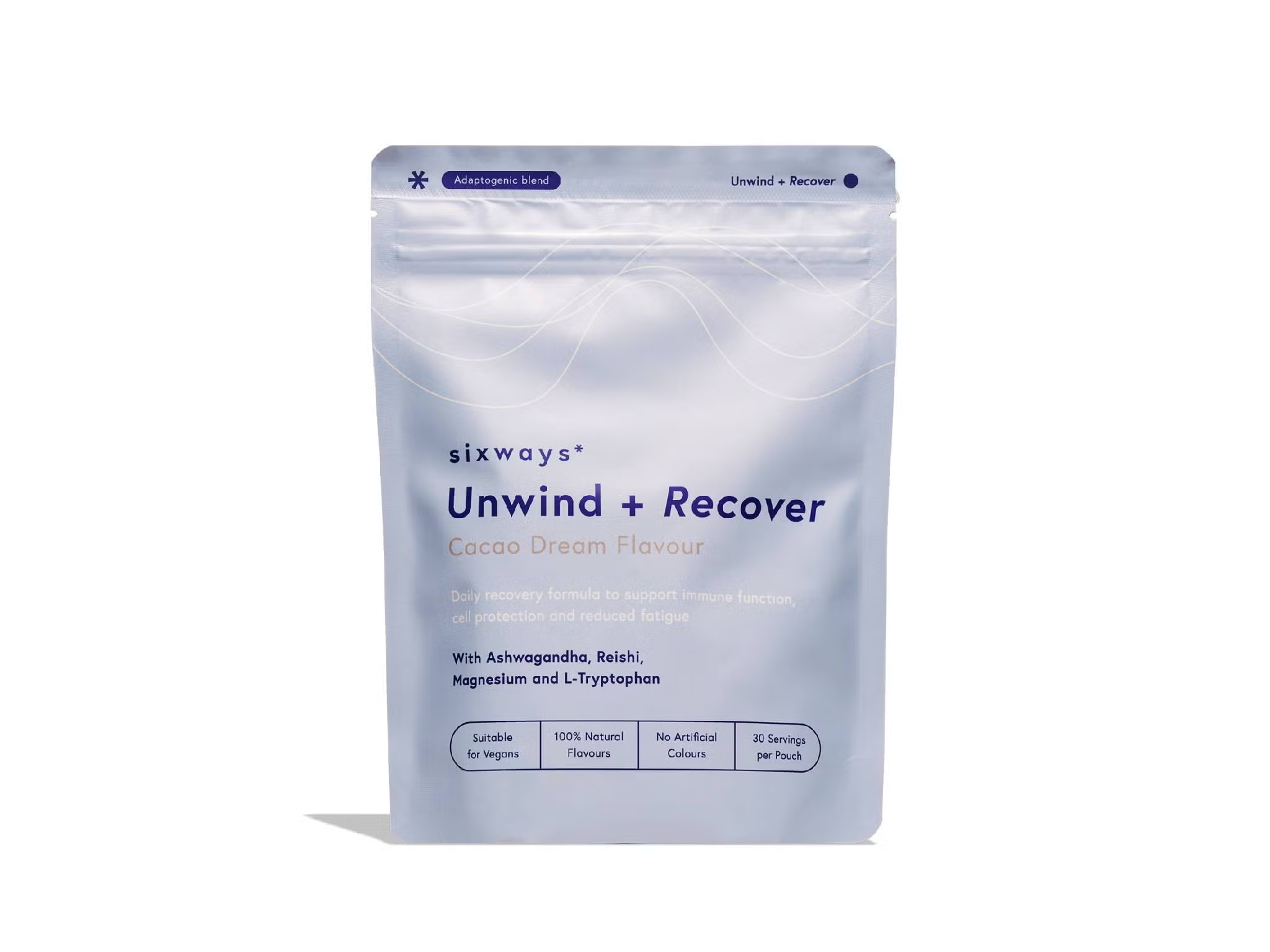
Best: magnesium supplement blend
Nutritional value (NV): 50 per cent
Magnesium type: Magnesium bisglycinate
How to take it: Add a scoop to hot or cold water
Why we love it
- Powdered form is easy to drink
- Added ashwagandha and reishi mushroom
“Another way to increase your magnesium intake and support your body (and hormones), particularly when it comes to helping you ease into a state of rest and relaxation in the evening, is to drink a cup of this,” recommends Shand.
This powdered magnesium blend is vegan-friendly, tastes like cacao and doesn’t contain any artificial flavours. The brand recommends adding a single scoop to hot or cold water ahead of settling down for bed.
“This potent adaptogenic formula contains magnesium, ashwagandha and reishi mushroom, which work together to provide the perfect calming and delicious-tasting magnesium-rich elixir,” says Shand.
This is one of my favourite sleep aids and makes for a great chocolately hot drink before bed. Sixways often adds functional mushrooms to many of its powdered supplements for an extra boost, so this blend with magnesium is extra soothing and great for brain health, too.
Buy now £32, Sixways.co
Metagenics mega mag calmeze magnesium powder
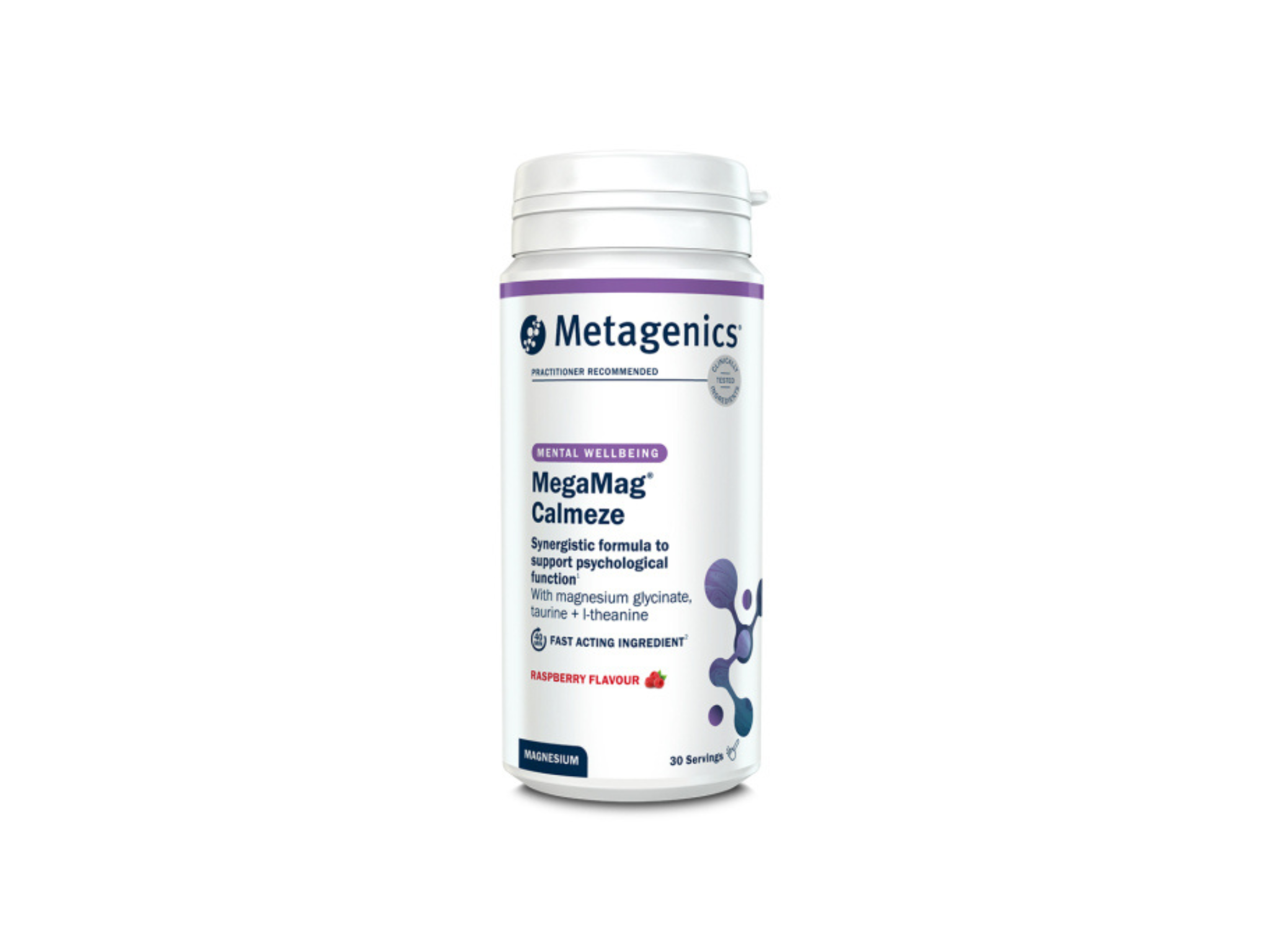
Best: vegan magnesium supplement
Nutritional value (NV): 53 per cent
Magnesium type: Magnesium glycinate
How to take it: Mix 1 scoop into 100-250ml water and drink daily
Why we love it
- Powdered form
- Three flavours
- Added vitamins for energy
This is another supplement powder option that, according to Packham, “combines highly absorbable magnesium glycinate with B vitamins and amino acids like taurine and l-theanine to help relieve feelings of stress, improve mood and optimise energy”.
It’s a vegan and gluten-free blend designed to help tackle fatigue, which can sometimes be an issue for those following a plant-based diet or people experiencing perimenopause and menopause symptoms.
This magnesium supplement is available in raspberry, orange, and chamomile flavours, “making it palatable and easy to add into your afternoon routine.” Packham adds.
For those who find it challenging to swallow pills, a powder like this is a great option. Simply mix it with water and enjoy it with a meal. The flavours aren’t unpleasant and make taking supplements that little bit easier.
Buy now £38.99, Metagenics.co.uk
JSHealth Advanced magnesium powder
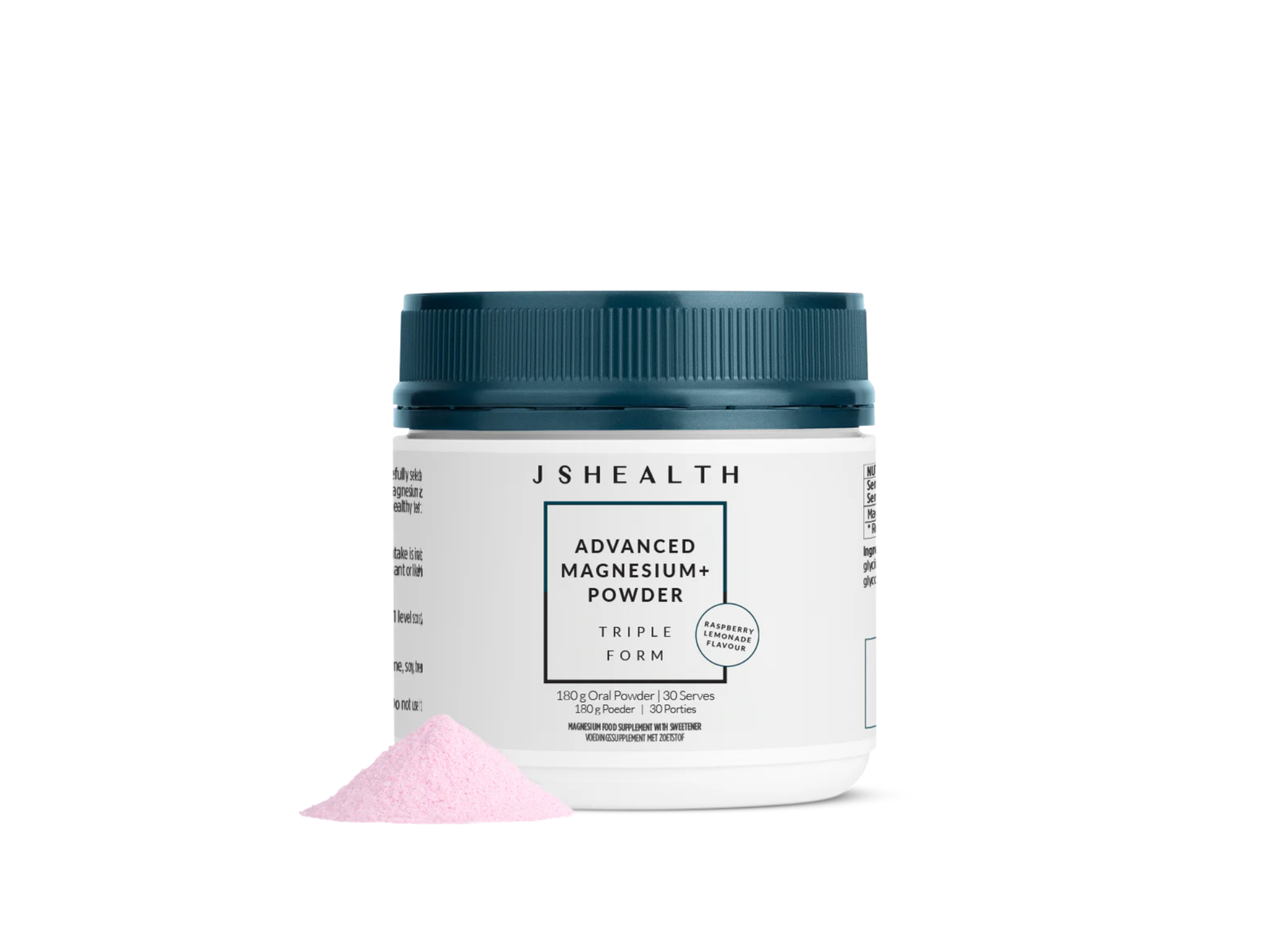
Best: magnesium supplement powder
Nutritional value (NV): 100 per cent
Magnesium type: Magnesium amino acid chelate, glycinate and citrate
How to take it: Mix 2 scoops (6g) of powder with water and drink
Why we love it
- Several types of magnesium
- Powder is easy to drink
- Larger dose
Packham explains that “this is a better option than JSHealth’s magnesium tablet as it contains fewer binding agents. Many supplement brands, not all, will add extra ingredients to their capsules and pills to preserve the contents, so a powder like this is a good alternative.”
With three forms of high-absorption magnesium, this powder from JSHealth is ideal for those who might struggle to swallow a daily supplement – just mix the raspberry lemonade flavour powder with water. It contains no artificial colours, sweeteners or flavours and is a good way to get your recommended daily dose of magnesium.
However, do bear in mind that if you already consume plenty of foods that are rich in this mineral, a serving of this powder might be too much on top of your daily intake.
I generally take this powder if I’m stressed and struggling to sleep. I’ll make a mocktail with it and drink it before bed.
Buy now £24.99, Jshealthvitamins.com
Inessa magnesium
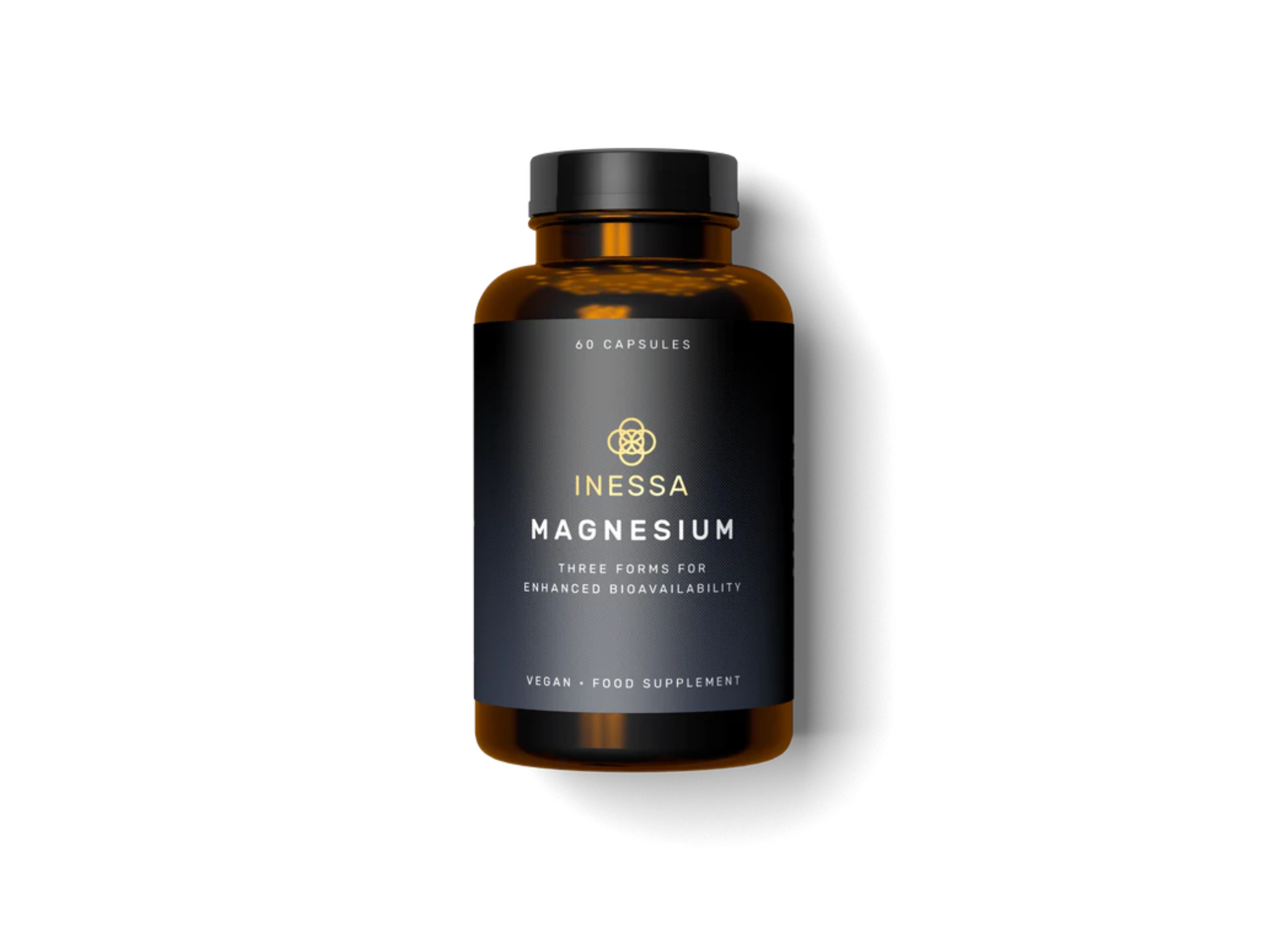
Best: magnesium supplement for multiple types of magnesium
Nutritional value (NV): 41 per cent
Magnesium type: Marine magnesium, glycinate and threonate
How to take it: Take two per day
Why we love it
- Blend of three types of magnesium
- No fillers or additives
- Vegan
“Inessa is a quality supplement brand and one I recommend in some of my individual client protocols. Magnesium bisglycinate can be easier for the body to absorb, and the capsules also contain a more bioavailable form of magnesium from marine sources,” says Packham.
These supplements are free from fillers and binders, delivering the nutrients inside in as pure a form as possible. They’re also vegan and gluten-free.
The first brand of magnesium I tried was Inessa’s, and it transformed my sleeping habits. It’s still one of my favourites and I always recommend the brand to friends and family.
Buy now £24.99, Inessawellness.com
Your questions about magnesium supplements answered
What are the benefits of magnesium supplements?
From energy production to bone health and normal psychological function, magnesium plays a key role in over 300 enzymatic reactions in your body. Magnesium supplements can offer a range of benefits, including helping with sleep, supporting bone health, improving mood and energy, combating restless legs and helping with muscle recovery.
When is the best time to take magnesium supplements?
The best time to take magnesium supplements tends to be with meals to avoid an upset stomach. “It’s better to take your magnesium supplements in the evening as you get more relaxation benefits”, adds Packham. Many people choose to take magnesium before bed for its sleep benefits. Some might also take it after exercise in order to aid muscle repair.
How long do magnesium supplements take to work?
How long magnesium supplements take to work can vary from person to person, “depending on how deficient you may be, how bioavailable the formula is and how well you absorb the nutrient in your body,” Packham explains.
It might be the case that you “feel effects quite quickly in a matter of a week or two for some people, but I would give it at least four to six weeks if you’re taking it to correct a deficiency”, recommends Packham. “Be aware that it can also take up to several months, so consistency really is key if you’re trying to build up optimal levels from a state of deficiency,” she adds.
Is it safe to take magnesium daily, and which types of magnesium are best?
“It’s safe to take magnesium every day; however, in terms of dosage, always stick to the recommended amounts as taking it in excess can lead to side effects, such as diarrhoea and nausea,” Packham says.
She generally recommends that “magnesium glycinate is best for sensitive digestive systems, whereas magnesium oxide, magnesium chloride and magnesium gluconate may be more likely to cause side effects,” she adds.
Always speak to a medical professional ahead of adding supplements to your routine if you’re at all unsure, have a medical condition or need further information.
Why you can trust IndyBest reviews
As the The Independent's Fitness and wellbeing editor, Emilie Lavinia spends her days working with leading doctors and health experts, reading the latest research on supplements, skin, the menopause and more. She has been reporting on health and wellness for more than a decade and uses this experience to ask experts the questions that need to be asked. She’s also an expert product tester, and has reviewed everything from natural deodorants to the best probiotics for gut health, as well as putting together our expert guide to the best supplements.
Meet the experts
Both Jess Shand and Maz Packham are qualified nutritionists with decades of experience and know everything there is to know about vitamins, minerals and the vital nutrients that support our health. Part of our approved cohort of experts, they’re able to advise on and recommend the best products for quality, bioavailability and value.
Looking to boost your health and immunity? We’ve rounded up the best vitamin D supplements







